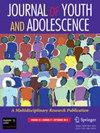父母价值示范是青少年经历和对危险行为发生后父母警告反应的决定因素。
IF 3.6
1区 心理学
Q1 PSYCHOLOGY, DEVELOPMENTAL
引用次数: 0
摘要
当父母第一次了解到他们青少年的问题行为时,他们可能会警告他们的孩子,进一步参与问题行为将导致更多的限制、监视或资源退缩。然而,研究还没有调查青少年是如何经历和回应这些警告的。基于对父母在行为中展示其价值观优点的益处(内在价值展示)的研究,本研究考察了内在价值展示作为青少年对警告反应的调节因素的潜在作用。参与者是105名以色列青少年(年龄为14.87岁,SD = 1.52, 57.1%为女性),他们完成了一项个性化调查,要求他们指出他们在上个月从事的29种问题行为中的哪一种。然后,调查选择了青少年从事的最严重的问题行为,并要求他们评价父母对这种行为的两种反应——警告和换位思考,他们在父母的反应之后的经历和反应,问题行为的复发,以及父母在行为中展示他们价值观的一般倾向。正如假设的那样,在青少年问题行为特征和父母换位思考受到控制的情况下,青少年更有可能将父母的警告视为需求挫折,并在他们认为父母未能在行为中表现出他们的价值观时做出反抗性反应。此外,内在价值展示与父母需求支持反应的感知正相关,与父母需求挫败和蔑视反应的感知负相关。这些发现表明,父母的内在价值展示可能是一种保护因素,使青少年较少消极地体验父母的警告。本文章由计算机程序翻译,如有差异,请以英文原文为准。
Parents Value Demonstration as a Determinant of Youth Experiences and Responses to Parents' Warnings Following the Onset of Risk Behavior.
When parents first learn about their adolescent's problem behaviors, they may warn their teen that further involvement in problem behaviors will lead to increased restraints, surveillance, or resource withdrawal. However, research has not investigated how adolescents experience and respond to such warnings. Drawing on research on the benefits of parents' demonstration of the merit of their values in their behavior (inherent value demonstration), this study examined the potential role of inherent value demonstration as a moderator of youth responses to warnings. Participants were 105 Israeli adolescents (Mage = 14.87 years, SD = 1.52, 57.1% female) who completed an individualized survey asking them to indicate which of 29 problem behaviors they had engaged in during the last month. The survey then selected the most serious problem behavior youth engaged in, and asked them to rate two parental reactions - warnings and perspective-taking - to the onset of this behavior, their experiences and responses following parents' reactions, problem behavior recurrence, and parents' general inclination to demonstrate their values in their behavior. As hypothesized, and with youth problem behavior characteristics and parents' perspective-taking controlled, youth were more likely to experience their parents' warnings as need-frustrating and respond defiantly when they perceived their parents as failing to demonstrate their values in their behavior. Additionally, inherent value demonstration was positively associated with perception of parents' reactions as need supporting and negatively related to perception of parents reactions as need thwarting and defiance. These findings suggest that parents' inherent value demonstration may function as a protective factor that enables youth to experience their parents' warnings less negatively.
求助全文
通过发布文献求助,成功后即可免费获取论文全文。
去求助
来源期刊

Journal of Youth and Adolescence
PSYCHOLOGY, DEVELOPMENTAL-
CiteScore
8.20
自引率
6.10%
发文量
155
期刊介绍:
Journal of Youth and Adolescence provides a single, high-level medium of communication for psychologists, psychiatrists, biologists, criminologists, educators, and researchers in many other allied disciplines who address the subject of youth and adolescence. The journal publishes quantitative analyses, theoretical papers, and comprehensive review articles. The journal especially welcomes empirically rigorous papers that take policy implications seriously. Research need not have been designed to address policy needs, but manuscripts must address implications for the manner society formally (e.g., through laws, policies or regulations) or informally (e.g., through parents, peers, and social institutions) responds to the period of youth and adolescence.
 求助内容:
求助内容: 应助结果提醒方式:
应助结果提醒方式:


